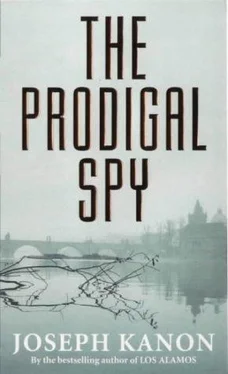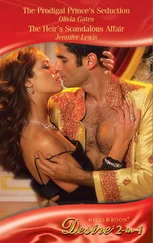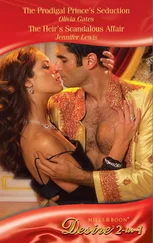“Turn up here.”
Nick saw the sign. “Terezin?”
“In German, Theresienstadt.”
“The model camp. Where they took the Red Cross.”
His father nodded. That’s right. The model camp. In the museum, by the Jewish cemetery in Prague, they have the children’s drawings. They are-well, you’ll see them.“
They parked outside an old fortress, the walls of a castle town.
“Why are we doing this?” Nick said. “I don’t want a history lesson. I want to talk to you.”
“This is what we’re talking about. I want to start at the beginning. So you’ll understand.”
There were no other cars, and when a guard appeared, grumbling in Czech, Nick thought it must be closed, but his father flashed some card in his wallet and the guard, straightening himself, nodded a salute and passed them through.
The air was utterly still, not even moved by birds, and it carried the crunch of their shoes on the dirt. All the buildings were not just empty but abandoned, like a western ghost town whose mine had played out. There had been no attempt to turn it into a museum park, no flower beds or lawns, as if the ground itself had resisted any signs of new life. Just the graveyard stillness. The buildings, some of them old, pieces of architecture, had been left to rot, exhausted by their own terrible history. It was not the kind of concentration camp Nick had seen in a thousand photographs-the railway tracks to the smokestacks, the long barracks, wrought iron twisted into messages-but there was no mistaking the stillness. They had left their dread behind, and it still hung in the air, as real as blood.
“People have the idea that it wasn’t so bad here,” his father said, taking them farther into the compound. “You know-the orchestra, the children’s drawings. Like summer camp. But sixty thousand died here. The rest they sent to Auschwitz, the other camps. Everybody died. You see the bunks.” He gestured toward an open door, where Nick could see bunk beds stacked to the ceiling. “Nine in a bunk. Sometimes more. You can imagine. Typhus. Dysentery. Well, you can’t imagine. Nobody can. People think that because there were no ovens-but over sixty thousand. Here, not shipped out. They didn’t need gas chambers. They just shot them, one by one. Or the gallows. Not very efficient but maybe more satisfying. They could watch.”
Nick followed him down the dusty street, saying nothing. This happened in my lifetime, he thought.
“At the end there, through that gate, is where they shot them.”
“I don’t want to see this,” Nick said, claustrophobic.
“There’s just one thing.” He stopped at a house near the end. Next to it was an empty swimming pool, with bunches of old leaves stuck in rain puddles on the cracked concrete. “This was the commandant’s house.”
“He had a swimming pool?”
“For his daughters. Little girls. The prisoners would march by here on their way to the firing range.” He pointed again to the open area through the gate. “They shot them over there.”
So close. The sharp crack of gunfire. Not once. All day.
“They would hear,” Nick said, picturing it.
“Yes. While they were swimming. The first time I saw this-what kind of people were these? Little girls swimming, and all the time-”
“Maybe there was a fence,” Nick said dully. “So they couldn’t see.”
“No. No fence.”
Then the prisoners would see them too, Nick thought. Splashing. The last thing they would see.
“Why are you showing me this?” he said, turning away from the pool.
“I want you to understand what they were. Nothing will make sense without that.”
Nick looked at him, sensing where he was heading. “You don’t have to explain yourself to me.”
“No? I think I do. The politics of another generation — they’re never real, are they? What was the point? Thirty years from now, they’ll ask you. What was so important? But it was important.”
Nick thought of Jan Palach. Important enough to light a match.
“In Prague,” his father said, “you see all the statues. Hussites. Catholics. What was that? Nobody remembers. But at the time, if you lived then.”
Nick looked down, moving his shoe across the dirt like a visible thought. “You didn’t know about this. Not then.”
“The swimming pool, no. But we knew what they were. All you had to do was listen.”
“And?”
“And no one was stopping them. No one. America First. It’ll all just go away. Or maybe it’s a good thing. People thought that then, you know. We had our own Nazis. My God, Jim Crow. People with sheets over their heads. That doesn’t seem real anymore either, does it? Father Coughlin on the radio, that prick.”
Nick glanced up, oddly reassured by the familiarity of his father’s scorn. Still an anti-cleric. But his father was racing now.
“And you could see what the Nazis were doing. Austria-just like that. They weren’t going to stop. Then Czechoslovakia. The Sudeten, but we knew it meant the whole thing. Why not just hand it over? The English,” he said, waving his hand. “And nobody in Washington lifted a finger. Couldn’t. It would have been bad politics. Nobody was trying to stop them.”
“Except the Communists,” Nick said quietly, following his logic. “That’s when you became a Communist.”
“Yes. After Munich. That was the last straw. Strange, in a way. I didn’t have any special feeling for the Czechs. Your grandparents had family here-in the Sudeten, in fact — but I never felt Czech. I don’t feel Czech now. I think it was the helplessness, the feeling that you had to do something.” He stopped, then managed a shrug. “Another generation’s politics. How do you explain it? Maybe I was ready, and then Munich came along.” He glanced up at Nick. “I wasn’t the only one, you know. A lot of people joined in the thirties. There were good reasons then. Well, we thought there were.”
Nick looked at him. “They didn’t become spies,” he said. He turned back toward the entrance gate. “Let’s go.”
His father followed him. Outside the walls, near the car, he touched Nick’s elbow. “Let’s walk for a bit.”
Involuntarily, Nick drew his elbow in. “Not in there,” he said, but he began to walk. “What made you ready?”
“I was impatient.” Nick caught the tiny barb and slowed to his father’s pace. “The times,” his father said vaguely. “You can’t imagine what things were like then. You remember where Grandma lived?”
They had visited a few times when Nick was a child. Collieries and slag heaps and cookie-cutter company houses. The big coal stove in the basement kitchen, where his grandmother seemed to live, held by the warmth. A photograph of Roosevelt on the wall. The Last Supper, draped with a frond from Palm Sunday. Upstairs, the parlor with doilies where the priest visited once a year and no one sat.
“People literally went hungry in those days. I had friends, children, who worked in the breakers. Half the miners were on relief. You picked up coal by the tracks, the pieces that fell off the cars. In a burlap bag. You had to drag it home if it got too heavy. But I was lucky-I got out. I was going to change all that.”
“She never believed you did it,” Nick said. “Grandma. She wouldn’t look at the papers. She said it was a mistake.”
His father stopped and took a breath, as if he’d been punched.
“In the early days we did change things,” he continued, refusing to be distracted. “Washington was exciting. The New Deal.” He pronounced it for effect, like a foreign phrase. “We were just out of law school-what did we know? We thought we could change anything. Nothing could stop us. But they did. I think we just knocked the wind out of them, and then, when they caught their breath, there they were again. The Welleses, the Rankins-they were always there, you know. We didn’t invent them after the war. Defenders of the faith. Whatever it was. Themselves, mostly.”
Читать дальше












